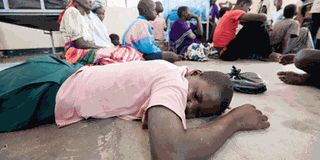Ministry responds to Gulu’s cries over nodding disease

Nodding disease patients at Obakoor Village, Atanga Sub-county in Pader District await better management of the disease. The health ministry says Gulu District will receive officials to manage the syndrome. Photo by Javier Gonzalez Manso
What you need to know:
Early this year, several children with nodding disease were brought to Mulago for better management.
The Ministry of Health has responded to calls by leaders of Gulu District for immediate support for children suffering from the nodding disease syndrome.
The leaders, civil societies and humanitarian agencies had last week threatened to transport the affected children to Parliament. They also wanted the region declared a disaster area.
The Permanent Secretary of the ministry, Dr Asuman Lukwago, in a communication to the district this week, said officials from the health ministry would start camping in the nodding disease affected areas by Sunday.
Dr Lukwago also indicated that the officials after meeting with the district leadership over the nodding syndrome, would spearhead the setting up of grassroot structures to identify and refer cases to recommended health centres for administration.
The district chairperson, Mr Martin Ojara Mapenduzi, and his councillors demanded for about 2,000 metric tonnes of food for the affected children, a special van, two motorcycles and adequate money to respond to the crisis in Odek, Palaro, Lalogi and Awach sub-counties, the worst affected areas.
At least 390 cases have been identified while 11 children have since died of the disease.
The health ministry had earlier sent Shs50 million to the district to help respond to the disease but Mr Mapenduzi said the money is a mockery to the district considering the numerous cases.
Mr Mapenduzi while briefing Civil Society Organisations on the state of the nodding disease in the district on Wednesday said: “I had a long conversation with the PS of the health ministry who pledged to ensure that everything is done for the wellbeing of the affected children.”
Dr Opar, the coordinator of the National Task Force for the disease, however, noted that unless there is close coordination between the district and the line ministries, efforts to contain the disease are bound to fail.
“We need a strong coordination strategy before the deployment to the health camp in Odek Sub-county,” Dr Opar said.
Health experts have investigated the causes, the mode of transmission and treatment of the disease since its outbreak in 2007, but there are still no positive results.
At least 7,000 children have so far been affected by the disease out of which at least 400 have been confirmed dead.



